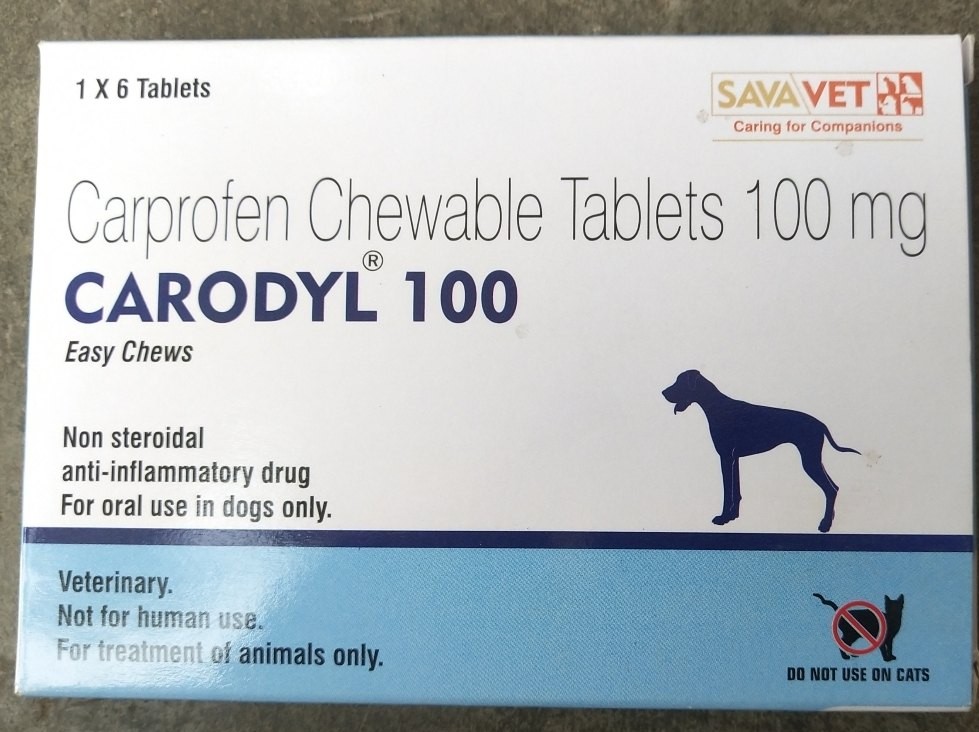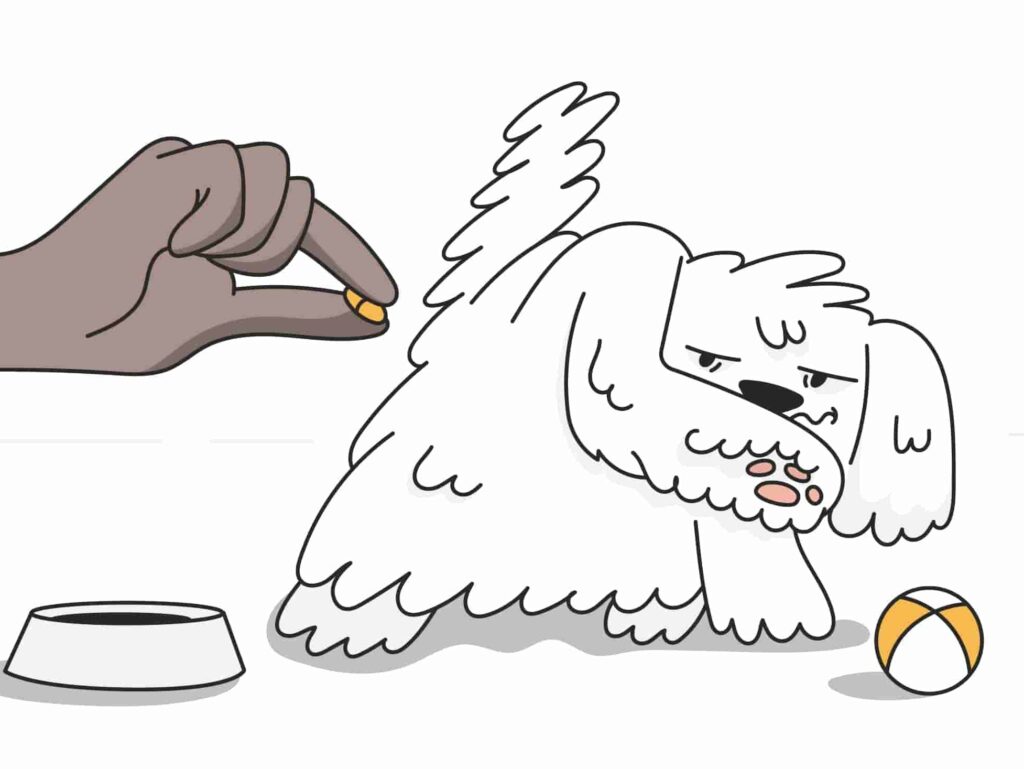In the heartwarming realm of furry companionship, our canine pals often become more than just pets – they’re family. Just like any family member, they deserve the best care, especially when they’re feeling under the weather. That’s where “carprofen” steps onto the scene – a potential game-changer in providing comfort to our loyal buddies.

This article is your guide to the world of carprofen for dogs, demystifying what it is, how it lends a paw in soothing discomfort, and the ins and outs of its safe usage. From understanding its benefits to navigating potential risks, we’re on a mission to ensure you’re well-equipped to make the best decisions for your four-legged friend’s well-being.
So, let’s embark on a journey of canine care, exploring how carprofen might just become your furry companion’s new best friend.
Table of Contents
- What Is Carprofen?
- How Does Carprofen Work?
- When To Use Carprofen For Dogs?
- How To Use Carprofen
- What are the Side Effects and Risks of Carprofen for Dogs?
- Natural Alternatives For Carprofen
- FAQs
- 1) Is Carprofen safe for all dogs?
- 2) Can I give my dog human pain relievers instead?
- 3) Are there side effects I should watch for?
- 4) Can I use Carprofen long-term?
- 5) Are there natural alternatives to Carprofen?
- 6) Can I combine Carprofen with other medications?
- 7) How often should I visit the vet while my dog is on Carprofen?
- Conclusion
What Is Carprofen?
Carprofen is a nonsteroidal anti-inflammatory medication (NSAID) in the propionic acid class, which includes ibuprofen, naproxen, and ketoprofen ; duh not to worry, just scary medical names. The active ingredient is known by several different brand names, including Rimadyl, Vetprofen, Canidryl, Levafen, Norocarp, Rovera, Carprieve, Novox, and Quellin12.
Carprofen was licensed by the FDA for use in dogs only in 1996. It comes in a variety of forms, including tablets, chewable tablets, caplets, and injectable solutions. Carprofen is a prescription-only drug, so consult your veterinarian before administering it to your dog.
How Does Carprofen Work?
Carprofen, an NSAID in the propionic acid class, is a well-known treatment for relieving pain in dogs. It provides relief by inhibiting annoying prostaglandins without interfering with stomach or kidney processes. While the focus is on COX-2, COX-1 management may be included.

Proper use, directed by your veterinarian, keeps your pup’s well-being at the forefront. The benefits include improved mobility and a higher quality of life, thanks to carprofen’s tailored approach.
When To Use Carprofen For Dogs?
Carprofen is mostly utilized for two conditions: treating osteoarthritis-related pain[1] and inflammation, and managing post-operative pain following soft tissue or orthopedic surgeries.
According to Malcolm Weir, DVM, from VCA Hospitals, says, ” After all, we know that OA is a progressive, degenerative disease that worsens over time. By most estimates, 25% of all dogs (regardless of age) are affected by OA, and possibly 60% of dogs will show x-ray evidence of the disease in their lifetime. As a result, this makes OA the most common chronic disease they face”
Osteoarthritis is a painful joint condition that affects a large number of dogs, particularly the elderly. It wears away the cartilage that cushions the joints, resulting in bone pressing against bone. This causes your dog to experience discomfort, stiffness, edema, diminished mobility, and a lower quality of life.
Carprofen can help reduce osteoarthritis symptoms by lowering joint inflammation[2] and making your dog more comfortable. It can also decrease disease progression by blocking the generation of osteoclast-activating factor (OAF), a chemical that promotes bone resorption.
How To Use Carprofen
Carprofen, your dog’s comfort ally, comes with a usage booklet with expert instructions from your veterinarian. Dosage and frequency are determined by characteristics such as weight, health, and responsiveness to treatment.
The average daily dose is 2 to 4 milligrams per kilogram of body weight. Consider a 10 kg dog receiving 20 to 40 mg daily, divided once or twice as directed by the vet.
Carprofen can be taken with or without meals, however it may make digestion easier.

Keep the water bowl filled with water. Remember, carprofen is a sprint to relief, not a marathon. Treatment duration is determined by the ailment; for example, osteoarthritis may necessitate a lengthy stay, whereas post-operative pain is granted a brief reprieve.
Carprofen’s impact may extend deeper into the spectrum to include liver or renal issues, bleeding tendencies, skin sensitivities, behavioral alterations, seizures, or allergic reactions. These incidents are less common, but they require emergency veterinarian intervention.
What are the Side Effects and Risks of Carprofen for Dogs?
Carprofen is used to relieve pain following surgeries such as spaying/neutering, dental work, tumor removal, fracture repairs, and other procedures. These procedures can make your dog feel agitated and irritated. Carprofen comes into play here, quieting pain signals by taming those bothersome prostaglandins.

Carprofen can be given before or after surgery, as directed by your veterinarian. What’s more, the best part? It collaborates with other pain medicines, such as opioids or local numbing agents, to provide your furry buddy with the extra relief they require. Here we go, smooth recovery!
Keep a look out for the following influencers who are increasing the likelihood of negative effects:
Age:
Our senior friends may respond more strongly, necessitating lower doses or careful monitoring.
Weight:
Dogs who tip the scales in either direction may experience altered carprofen dynamics, necessitating dose adjustments or heightened attention.
Specific breeds:
Such as Labs, German Shepherds, or Collies, may be more sensitive to specific carprofen side effects.
Pre-existing illnesses such as liver or kidney disease, heart disease, bleeding tendencies, or infections raise the risk scale.
Carprofen’s combination with other medicines – NSAIDs, steroids, anticoagulants, anticonvulsants, antibiotics, or vitamins – may exacerbate side effects or reduce efficacy.
Natural Alternatives For Carprofen
Beyond carprofen, there are natural alternatives to ease your dog’s discomfort:
- Glucosamine and chondroitin: Repair joints, ease arthritis.
- Omega-3 fatty acids: Fight inflammation, boost skin health.
- Turmeric: Soothe with anti-inflammatory properties.
- CBD oil: Reduce pain, aid anxiety, and more.
- Acupuncture: Stimulate natural pain relief.
While these options might not be as swift as carprofen, they typically carry fewer risks.[3]
Still, consult your vet before making the switch, and monitor your pup’s response closely. 🐾🌿
FAQs
1) Is Carprofen safe for all dogs?
Carprofen is generally safe, but individual factors like age, breed, and health conditions can affect its suitability. Consult your vet to determine if it’s the right choice for your dog.
2) Can I give my dog human pain relievers instead?
No, it’s important to use medications specifically designed for dogs. Human pain relievers can be harmful or even fatal to dogs.
3) Are there side effects I should watch for?
Yes, common side effects include gastrointestinal issues. Monitor your dog for any unusual behavior and consult your vet if you have concerns.
4) Can I use Carprofen long-term?
Long-term use should be discussed with your vet. They can help assess your dog’s condition and recommend the best treatment plan.
5) Are there natural alternatives to Carprofen?
Yes, options like glucosamine, omega-3 fatty acids, and turmeric can offer relief. Always consult your vet before introducing any new supplements or treatments.
6) Can I combine Carprofen with other medications?
Only under the guidance of your vet. Mixing medications without professional advice can lead to adverse effects.
7) How often should I visit the vet while my dog is on Carprofen?
Regular check-ups are important to monitor your dog’s response and adjust treatment if needed. Your vet will guide you on the right schedule.
Conclusion
In conclusion, Carprofen can be a valuable tool in managing pain and discomfort in dogs, especially those dealing with conditions like arthritis or recovering from surgery. It works by targeting the source of inflammation, providing relief and an improved quality of life for our furry friends.
However, like any medication, Carprofen comes with considerations and potential risks. Consulting a veterinarian before use is crucial to ensuring the right dosage and usage. Additionally, exploring natural alternatives and closely monitoring your dog’s response can further contribute to their well-being.
Remember, your veterinarian is the best resource to guide you in making the best choices for your beloved pet.
Reference:
- Managing osteoarthritis with monoclonal antibodies. (2023, May 5). Cornell University College of Veterinary Medicine. Retrieved August 9, 2023, from College of Vertinary Medicine
- Gonçalves, R., De Decker, S., Walmsley, G., Butterfield, S., & Maddox, T. W. (2022). Inflammatory disease affecting the central nervous system in dogs: a retrospective study in England (2010–2019). Frontiers
- Kang, Y., Lee, H. J., Lee, C. J., & Park, J. (2019). Natural products as sources of novel drug Candidates for the pharmacological Management of osteoarthritis: A Narrative review. Biomolecules & Therapeutics, 27(6), 503–513.


